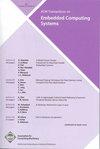多核嵌入式系统的最坏情况程序干扰估计
IF 2.8
3区 计算机科学
Q2 COMPUTER SCIENCE, HARDWARE & ARCHITECTURE
引用次数: 0
摘要
由于低成本和能源需求,网络物理系统正在采用多核处理器来满足其嵌入式计算需求。当应用程序有实时限制时,为了保证安全性,一个关键的要求是估计来自其他执行程序的最坏情况干扰。然而,多核硬件的复杂性阻碍了最坏情况下程序干扰的精确确定。现有的解决方案要么容易高估干扰,要么不能扩展到不同的硬件尺寸和设计。在本文中,我们提出了Kryptonite,一个自动合成多核系统的最坏情况程序干扰(WCPI)环境的框架。Kryptonite的基础是一组特定于硬件的小型代码装置,它们被精心设计以最大限度地干扰本地。这些小工具使用贪婪方法进行排列,然后使用强化学习算法进行建模,以创建WCPI环境。我们在汽车级英飞凌AURIX TC399处理器上展示了Kryptonite,该处理器具有广泛的程序,包括商业实时汽车应用程序。我们表明,Kryptonite创建的WCPI环境虽然易于扩展和调优,但可将基准应用程序的运行时提高58%,将汽车应用程序的运行时提高26%。本文章由计算机程序翻译,如有差异,请以英文原文为准。
Kryptonite: Worst-Case Program Interference Estimation on Multi-Core Embedded Systems
Due to the low costs and energy needed, cyber-physical systems are adopting multi-core processors for their embedded computing requirements. In order to guarantee safety when the application has real-time constraints, a critical requirement is to estimate the worst-case interference from other executing programs. However, the complexity of multi-core hardware inhibits precisely determining the Worst-Case Program Interference. Existing solutions are either prone to overestimate the interference or are not scalable to different hardware sizes and designs. In this paper we present Kryptonite , an automated framework to synthesize Worst-Case Program Interference (WCPI) environments for multi-core systems. Fundamental to Kryptonite is a set of tiny hardware-specific code gadgets that are crafted to maximize interference locally. The gadgets are arranged using a greedy approach and then molded using a Reinforcement Learning algorithm to create the WCPI environment. We demonstrate Kryptonite on the automotive grade Infineon AURIX TC399 processor with a wide range of programs that includes a commercial real-time automotive application. We show that, while being easily scalable and tunable, Kryptonite creates WCPI environments increasing the runtime by up to 58% for benchmark applications and 26% for the automotive application.
求助全文
通过发布文献求助,成功后即可免费获取论文全文。
去求助
来源期刊

ACM Transactions on Embedded Computing Systems
工程技术-计算机:软件工程
CiteScore
3.70
自引率
0.00%
发文量
138
审稿时长
6 months
期刊介绍:
The design of embedded computing systems, both the software and hardware, increasingly relies on sophisticated algorithms, analytical models, and methodologies. ACM Transactions on Embedded Computing Systems (TECS) aims to present the leading work relating to the analysis, design, behavior, and experience with embedded computing systems.
 求助内容:
求助内容: 应助结果提醒方式:
应助结果提醒方式:


